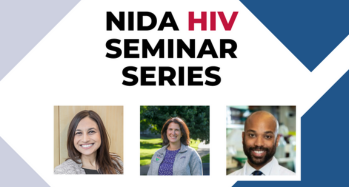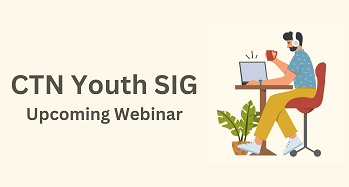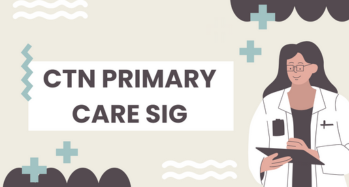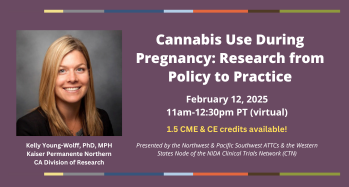Upcoming Events
This page is focused on publicly-accessible events related to the CTN and/or hosted by NIDA, Nodes, CTN study teams, or CTN SIGs and committees. We also list some major national/international conferences of particular interest to the Network.
For more national/international conferences and events, visit NIDA’s Meetings & Events page and this list from the journal Addiction.
Events
-
-
Addiction Health Services Research (AHSR) Conference, 2024
Palace Hotel 2 New Montgomery St., San Francisco, CA, United StatesThe Addiction Health Services Research (AHSR) conference, held since 2005, brings together researchers, policymakers, and treatment providers to solve the problems of inequity, access, effectiveness, and implementation of addiction services.
-
CTN Annual Scientific Meeting
Crystal Gateway Marriott 1700 Richmond Hwy, Arlington, VA, United StatesThis year's Annual Scientific Meeting (virtual and in-person) will be celebrating the 25th Anniversary of the CTN.
-

NIDA HIV Research Program Seminar Series: Let’s Talk PrEP
Webinar/VirtualJoin the NIDA HIV Research Program as we welcome a panel of leading experts in PrEP at the intersection of HIV and substance use research.
-
American Public Health Association Annual Meeting
Minneapolis Convention Center 1301 Second Ave S, Minneapolis, MN, United StatesThe 2024 APHA Annual Meeting and Expo will take place in Minneapolis, MN on Oct. 27-30, 2024. The theme for this year’s event is “Rebuilding Trust in Public Health and Science.”
-
-
CTN Youth SIG Webinar: Scaling Out Evidence-Based Interventions Through Primary Care Settings: the PAAS Program
The CTN Youth SIG is pleased to invite you to an upcoming presentation/webinar: Scaling out evidence-based interventions through primary care settings: A Case Study of the Pathways for African Americans (PAAS) Program Presenter: Velma McBride Murry, PhD Lois Autrey Betts Endowed Chair Co-Director, Vanderbilt University Medical Center Program for Health Equity Research Distinguished University Professor, Departments of Health Policy & Human and Organizational Development, Vanderbilt University This presentation will highlight the role of primary care setting as a conduit for evidence-based intervention access for families. In addition, attention will be given the need to focus on system level interventions to reduce the need for families and youth to be “resilient.” About the presenter: Dr. Velma McBride Murry holds the Lois Autrey Betts Endowed Chair, previously held an appointed position of Associate Provost, Research and Innovation, currently serves as Co-Director of the Vanderbilt University Medical Center Program for Health Equity Research (PHER), and is a University Distinguished Professor in Departments of Health Policy and Human and Organizational Development . She is Past President of the Society for Research on Adolescence and current President of The International Consortium of Developmental Science Societies. McBride Murry is one of the 100 elected members to the 2020 Class of the National Academic of Medicine. She is an appointed standing member of National Institutes of Health National Advisory Mental Health Research Council. Her research examines the significance of context to everyday life experiences of African American families and youth, focusing on processes through which racism, and other social structural stressors, cascade through families to influence parenting and family functioning, developmental outcomes, and adjustment among youth, during critical developmental periods from middle childhood through young adulthood. Register here!
-
CTN T&I SIG Webinar: Implementation Outcomes in NIDA Clinical Trials Network Studies
Join the Translation and Implementation SIG on November 19th for their next session, titled, "Implementation Outcomes in NIDA Clinical Trials Network Studies: A Systematic Review of Studies Conducted Over 25 Years in the CTN."
-
NIDA CTN – Future of AI in Medicine: Medical Imaging as an Example
Join the NIDA CCTN on November 20 (12pm ET) for a webinar on the future of AI in medicine! Presenter: Dr. Curt Langlotz Professor of Radiology, Medicine, and Biomedical Data Science Senior Associate Vice Provost for Research Director, Center for Artificial Intelligence in Medicine & Imaging Senior Fellow, Institute for Human-Centered Artificial Intelligence Artificial intelligence (AI) is an incredibly powerful tool for building systems that support the work of clinicians and researchers. Over the last decade, machine learning methods have revolutionized the analysis of medical data, leading to high interest and explosive growth in the use of AI and machine learning methods. These promising techniques create systems that perform some clinical tasks at the level of expert physicians. Deep learning methods in imaging are now being developed for image reconstruction, imaging quality assurance, imaging triage, computer-aided detection, computer-aided classification, and radiology report drafting. The systems have the potential to provide real-time assistance to radiologists and other imaging professionals, thereby reducing diagnostic errors, improving patient outcomes, and reducing costs. We will review the origins of AI and its applications to medicine, and medical imaging, define key terms, and show examples of real-world applications that suggest how AI may change the practice of medicine. We will also review key shortcomings and challenges that may limit the application of these new methods. Learning objectives About the presenter Curtis P. Langlotz, MD, PhD : Dr. Langlotz is Professor of Radiology, Medicine, and Biomedical Data Science, and Senior Associate Vice Provost for Research at Stanford University. His NIH-funded laboratory develops machine learning methods to improve the accuracy and efficiency of medical image interpretation. He also serves as Senior Fellow at Stanford’s Institute for Human-Centered Artificial Intelligence and Director of the Center for Artificial Intelligence in Medicine and Imaging (AIMI Center), which supports over 200 faculty at Stanford who pursue interdisciplinary machine learning research to improve clinical care. Register here!
-
-
Northeast Node Webinar: Medications for OUD for Youth
In 2021, one in every 100 kids aged 12-17 had an opioid use disorder (OUD). Medication treatment for OUD (MOUD) is effective, but only 3-4% of youth who need it receive treatment. This session will outline features of youth treatment for OUD, evidence for treating youth with medications, youth MOUD uptake and retention, the role of families in care, and opportunities for interdisciplinary care teams in outpatient settings. In this extended session, Dr. Marc Fishman (Mountain Manor & Johns Hopkins) will also facilitate interactive case reviews with attendees. If you have a case you would like to present, please let Bethany McLeman know: bethany.m.mcleman@dartmouth.edu Register here!
-
-

Youth SIG Webinar: Age, Period, and Cohort Effects in Alcohol and Other Substance Use
Webinar/VirtualThe presentation will overview what we know about current trends in substance use, how rates are organized by age, period, and cohort, and how these trends are shaping public health overall.
-

Primary Care SIG Webinar: Engaging Rural Communities and Practices in Substance Use Research
Webinar/VirtualThe January 27, 2025 Primary Care SIG meeting (12pm ET, 9am PT) will feature a panel to discuss how CARE for Health synergistically can enhance and contribute to CTN trials.
-
-
Northeast Node Science Series: ED Treatment of OUD: Innovation & Discovery
Webinar/VirtualIn this presentation, Dr. Gail D’Onofrio will talk about initiation of buprenorphine in the ED, innovations in dosing and formulations, and implementation strategies to improve uptake of evidence-based practices and integration into EDs across the country.
-

Western States Node: Cannabis Use During Pregnancy (1.5 CE/CME)
Webinar/VirtualIn this webinar sponsored by the Western States Node and the Northwest and Pacific Southwest ATTCs, Kelly Young-Wolff, PhD, MPH (a licensed clinical psychologist and research scientist at the Kaiser Permanente Northern CA Division of Research) will describe what is known about prenatal cannabis use trends and health consequences using data from Kaiser Permanente Northern California’s large integrated healthcare delivery system. She will discuss why pregnant individuals use cannabis, describe disparities in prenatal cannabis use and related outcomes, and end with a discussion about the potential harms of punitive policies that penalize or criminalize prenatal substance use. At the conclusion of the webinar, participants will be able to: Describe at least two (2) trends relating to changing rates of prenatal cannabis use over time. Explain at least three (3) reasons why pregnant individuals might be using cannabis. Specify at least three (3) potential risks of using cannabis during pregnancy. 1.5 CME or CE credits available! (Select credit type when you register; learn more about available credit types here.) Sponsored by the Northwest and Pacific Southwest Addiction Technology Transfer Centers (ATTCs) and the Western States Node of the NIDA Clinical Trials Network.